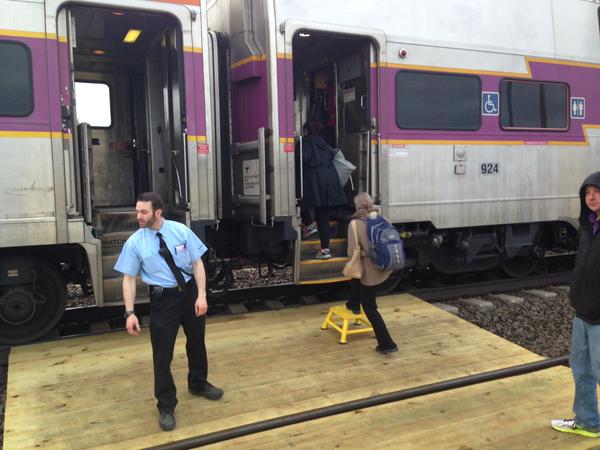Fare Collection on the T is Unfair
A recent disclosure by the MBTA reveals that the agency forgoes an estimated $35 million annually in ticket revenue due to poor fare collection practices on the commuter rail system alone. When the bus system and green line are included, this number inflates as high as $42 million.
Yes, this is the same cash-strapped agency that couldn’t wait to shut the doors on the costly late-night service, a program which cost $14.4 million a year while providing services to 13,000 riders a night.
Yes, this is the same transportation system that recently saw fit to raise fares an average of 9 percent to help fill a massive revenue gap.
And yes, this is under the “no-excuses” contract in which Keolis, the commuter rail operator, should be fined $500 for each failure to collect fares. Indeed, Keolis was fined for this issue nine times between October and December. However, this money was returned to Keolis, with all of the other fines, so that they could achieve the level of customer service that they agreed to provide in the contract.
Moving forward, in February there were 73 complaints issued by riders alleging that fares went uncollected on their train, but in that month the T didn’t fine Keolis once.
The no-excuses contract was supposed to incentivize Keolis to meet the terms of the contract by withholding their profits through performance fines, but if the fines are not applied then Keolis’ incentive to check each passenger’s ticket disappears.
The lost revenue amounts to more than just chump change for the commuter rail system. $35 million dollars represents a staggering 16 percent of the $215 million in projected revenue for 2016.
The first step in solving any problem is to diagnose it. The good news in all of this is that the T’s Fiscal and Management Control Board has prioritized improving fare collection on the commuter rail after Keolis’ first fare evasion survey conducted in early March.
But the question remains, how have we gotten here? The T does not require commuter rail passengers to purchase tickets ahead of time. Instead, riders can buy their tickets from the conductors or through an app while they are riding the train. This system would work, if the conductors could reliably check every person’s ticket on a crowded rush-hour train. If you ask anybody who’s been on such a train, you’ll find that this is a fantasy.
In fairness, anecdotal evidence suggests that Keolis has improved the consistency of ticket checks. Additionally, many commuter rail stations outside of the Hub don’t have ticket machines, requiring commuters to either purchase tickets ahead of time or rely on the conductors and app. Tickets should be easy to purchase ahead of time, raising the question of why there are no machines are most stations.
This method of ticket sales actually encourages riders to withhold their ticket purchase until the conductor arrives because there is a chance that they could ride for free. This not only forgoes an important and sizeable revenue source, it is also entirely unfair to those who purchase their monthly passes for as much as $362.
Clearly, the T must close the door on fare evasion in two ways. First, Keolis should be held to account for their poor collection practices. This problem was supposed to be remedied by the financial consequences outlined in the no-excuses contract, but these seem to have gone up in smoke with the $35 million in lost revenue. The MBTA should either use their profit-withholding stick, or else turn to the carrot and cut Keolis in on ticket revenue or citations to incentivize ticket checks.
Secondly, riders need to understand that failing to purchase a ticket will result in real consequences, not a free ride. The practice of allowing passengers to purchase tickets while already on the train is asking for trouble. Is $35 million is enough to install ticket machines at each commuter rail stop, or to bolster the number of conductors collecting fares? Either way, this is a broken system that needs to change.
Keolis has announced a $10 million plan to install fare gates at a few major downtown stations to help crack down on fare evasion in response to this issue. Similarly, the MBTA’s automated fare collection plans are promising proposals to reduce losses on the bus system and green line while improving riders’ experiences. Both ideas will help move towards an equitable and consistent fare collection system, but one must wonder how long this problem has gone undiagnosed or ignored.
While the T continues to look for ways to narrow the revenue gap, perhaps there are more in-house opportunities to reduce losses that avoid cuts to late-night service or fare hikes.



